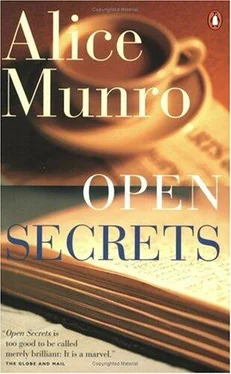Muriel decided that there had to be a maid of honor. Or a matron of honor. It could not be her, because she would be playing the organ. “O Perfect Love.” And the Mendelssohn.
It would have to be Millicent. Muriel would not take no for an answer. She brought over an evening dress of her own, a long sky-blue dress, which she ripped open at the waist — how confident and cavalier she was by now about dressmaking! — and proposed a lace midriff, of darker blue, with a matching lace bolero. It will look like new and suit you to a T, she said.
Millicent laughed when she first tried it on and said, “There’s a sight to scare the pigeons!” But she was pleased. She and Porter had not had much of a wedding — they had just gone to the rectory, deciding to put the money saved into furniture. “I suppose I’ll need some kind of thingamajig,” she said. “Something on my head.”
“Her veil!” cried Muriel. “What about Dorrie’s veil? We’ve been concentrating so much on wedding dresses, we’ve forgotten all about a veil!”
Dorrie spoke up unexpectedly and said that she would never wear a veil. She could not stand to have that draped over her, it would feel like cobwebs. Her use of the word “cobwebs” gave Muriel and Millicent a start, because there were jokes being made about cobwebs in other places.
“She’s right,” said Muriel. “A veil would be too much.” She considered what else. A wreath of flowers? No, too much again. A picture hat? Yes, get an old summer hat and cover it with white satin. Then get another and cover it with the dark-blue lace.
“Here is the menu,” said Millicent dubiously. “Creamed chicken in pastry shells, little round biscuits, molded jellies, that salad with the apples and the walnuts, pink and white ice cream with the cake—”
Thinking of the cake, Muriel said, “Does he by any chance have a sword, Dorrie?”
Dorrie said, “Who?”
“Wilkie. Your Wilkie. Does he have a sword?”
“What would he have a sword for?” Millicent said.
“I just thought he might,” said Muriel.
“I cannot enlighten you,” said Dorrie.
Then there was a moment in which they all fell silent, because they had to think of the bridegroom. They had to admit him to the room and set him down in the midst of all this. Picture hats. Creamed chicken. Silver leaves. They were stricken with doubts. At least Millicent was, and Muriel. They hardly dared to look at each other.
“I just thought since he was English, or whatever he is,” said Muriel.
Millicent said, “He is a fine man anyway.”
The wedding was set for the second Saturday in May. Mr. Speirs was to arrive on the Wednesday and stay with the minister. The Sunday before this, Dorrie was supposed to come over to have supper with Millicent and Porter. Muriel was there, too. Dorrie didn’t arrive, and they went ahead and started without her.
Millicent stood up in the middle of the meal. “I’m going over there,” she said. “She better be sharper than this getting to her wedding.”
“I can keep you company,” said Muriel.
Millicent said no thanks. Two might make it worse.
Make what worse?
She did not know.
She went across the field by herself. It was a warm day, and the back door of Dorri’s house was standing open. Between the house and where the barn used to be there was a grove of walnut trees whose branches were still bare, since walnut trees are among the very latest to get their leaves. The hot sunlight pouring through bare branches seemed unnatural. Her feet did not make any sound on the grass.
And there on the back platform was Albert’s old armchair, never taken in all winter.
What was in her mind was that Dorrie might have had an accident. Something to do with a gun. Maybe while cleaning her gun. That happened to people. Or she might be lying out in a field somewhere, lying in the woods among the old dead leaves and the new leeks and bloodroot. Tripped while getting over a fence. Had to go out one last time. And then, after all the safe times, the gun had gone off. Millicent had never had any such fears for Dorrie before, and she knew that in some ways Dorrie was very careful and competent. It must be that what had happened this year made anything seem possible. The proposed marriage, such wild luck, could make you believe in calamity also.
But it was not an accident that was on her mind. Not really. Under this busy fearful imagining of accidents, she hid what she really feared.
She called Dorrie’s name at the open door. And so prepared was she for an answering silence, the evil silence and indifference of a house lately vacated by somebody who had met with disaster (or not vacated yet by the body of the person who had met with, who had brought about , that disaster) — so prepared was she for the worst that she was shocked, she went watery in the knees, at the sight of Dorrie herself, in her old field pants and shirt.
“We were waiting for you,” she said. “We were waiting for you to come to supper.”
Dorrie said, “I must’ve lost track of the time.”
“Oh, have all your clocks stopped?” said Millicent, recovering her nerve as she was led through the back hall with its familiar mysterious debris. She could smell cooking.
The kitchen was dark because of the big, unruly lilac pressing against the window. Dorrie used the house’s original wood cookstove, and she had one of those old kitchen tables with a drawer for the knives and forks. It was a relief to see that the calendar on the wall was for this year.
Dorrie was cooking some supper. She was in the middle of chopping up a purple onion to add to the bits of bacon and sliced potatoes she had frying up in the pan. So much for losing track of the time.
“You go ahead,” said Millicent. “Go ahead and make your meal. I did get something to eat before I took it into my head to go and look for you.”
“I made tea,” said Dorrie. It was keeping warm on the back of the stove and, when she poured it out, was like ink.
“I can’t leave,” she said, prying up some of the bacon that was sputtering in the pan. “I can’t leave here.”
Millicent decided to treat this as she would a child’s announcement that she could not go to school.
“Well, that’ll be a nice piece of news for Mr. Speirs,” she said. “When he has come all this way.”
Dorrie leaned back as the grease became fractious.
“Better move that off the heat a bit,” Millicent said.
“I can’t leave.”
“I heard that before.”
Dorrie finished her cooking and scooped the results onto a plate. She added ketchup and a couple of thick slices of bread soaked in the grease that was left in the pan. She sat down to eat, and did not speak.
Millicent was sitting too, waiting her out. Finally she said, “Give a reason.”
Dorrie shrugged and chewed.
“Maybe you know something I don’t,” Millicent said. “What have you found out? Is he poor?”
Dorrie shook her head. “Rich,” she said.
So Muriel was right.
“A lot of women would give their eyeteeth.”
“I don’t care about that,” Dorrie said. She chewed and swallowed and repeated, “I don’t care.”
Millicent had to take a chance, though it embarrassed her.
“If you are thinking about what I think you may be thinking about, then it could be that you are worried over nothing. A lot of time when they get older, they don’t even want to bother.”
“Oh, it isn’t that! I know all about that.”
Oh, do you, thought Millicent, and if so, how? Dorrie might imagine she knew, from animals. Millicent had sometimes thought that if she really knew, no woman would get married.
Nevertheless she said, “Marriage takes you out of yourself and gives you a real life.”
Читать дальше












